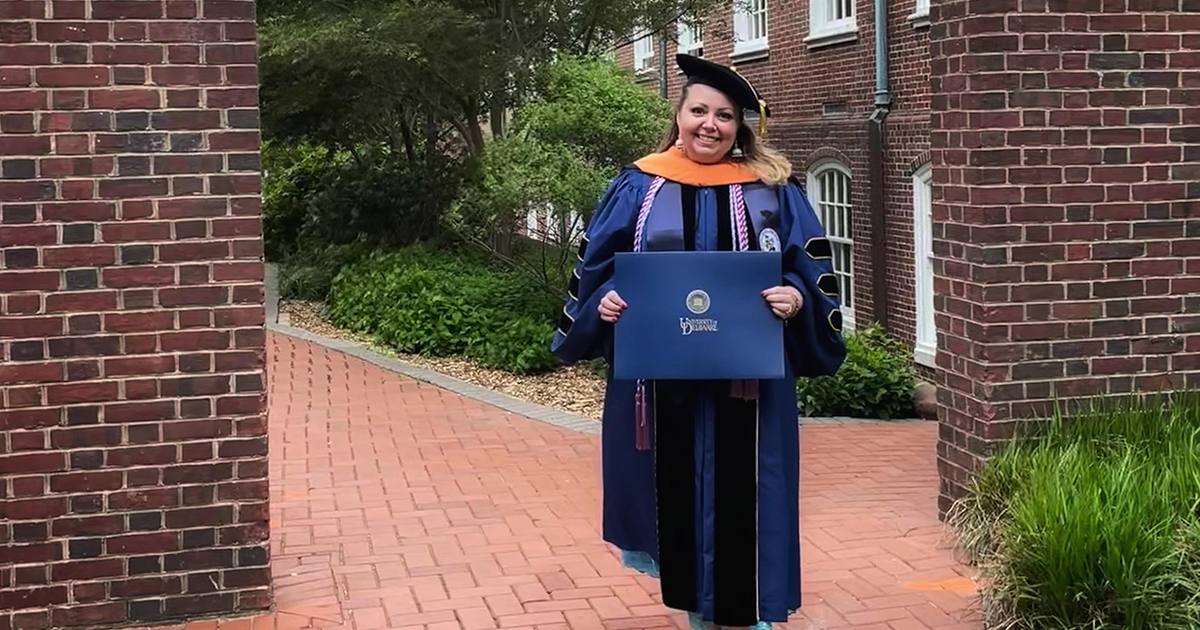
Category: School of Nursing

The next battlefront
November 06, 2023 Written by Amy Cherry | Photo submitted by Rebecca Ivory
UD School of Nursing alumna a nurse leader in veterans' mental health
In the mid-2000s, John*, a U.S. Navy SEAL, was on board a vessel for a search and seizure operation in rough seas near Africa. He was wearing heavy body armor and carrying equipment weighing 90 pounds. John had to board the ship by climbing up a rope. As he twisted and turned, climbing up the rope amid high winds, he injured his shoulder, spine, and hip. He reported his injuries to the Navy and had one option — surgery.
“I declined because if surgery went bad, it would have ended my career,” he said.
His injuries evolved into chronic pain.
“I was living on ibuprofen for my last eight years in the SEAL Teams,” he said.
John retired in the mid-2010s after 20 years of service, mainly as a SEAL. During that time, he did five deployments and many shorter missions overseas.
After retirement, John started experiencing nightmares, insomnia, and flashbacks to horrific moments during his missions.
“I’d have physical reactions, sweaty palms, increased heart rate, and trouble breathing,” he said.
John, who was married with children, also started struggling with family relationships.
“I think I developed ADHD in the Teams; I can’t concentrate or focus and often have intrusive thoughts,” he said. “My memory also isn’t as good as the civilians I work with who are older than me.”
He didn’t know it yet, but John was exhibiting classic signs of Operator Syndrome, a predictable and specific pattern of healthcare difficulties within the Special Operation Forces community, according to the International Journal of Psychiatry in Medicine. Operator Syndrome is caused by chronic exposure to microbrain injuries and a cumulative burden of chronic stress. It’s an area in which psychiatric nurse practitioner Rebecca Ivory specializes. She’s one of just a few published experts on the subject.
“There’s very few people doing this work,” Ivory said. “And it’s so profound. It’s an honor and privilege.”
The three-time University of Delaware alumna, who most recently obtained her doctorate in nursing practice (DNP) from UD’s School of Nursing (SON) in 2022, now consults for the SEAL Future Foundation (SFF) and serves on SFF’s Board of Health.
“Special Operators are chronically exposed to blasts from high-power firearms, controlled ordinance, and improvised explosive devices,” Ivory said. “This exposes their brain to blast waves, creating scarring on the brain and disruptions in the hypothalamic-pituitary-adrenal (HPA) axis. Between the scarring and HPA disruption, we see major medical problems. We then see the downstream effects of their brain being rattled around chronically.
“Chronic stress overload is another contributor to Operator Syndrome. Special Operators experience physical and psychological stressors throughout their career that are relentless and oppressive more so than the average servicemember.”
Ivory, a project lead at the University of Washington School of Nursing, became interested in Operator Syndrome through her doctoral work at UD, an institution uniquely suited for her to pursue her DNP.
“I could not have done this work if I had gone to almost any other school,” Ivory said. “UD School of Nursing had several faculty members who were veterans or were spouses of the military, and several more who have dedicated much of their career to working with veterans. Having those experts was important to me.”
